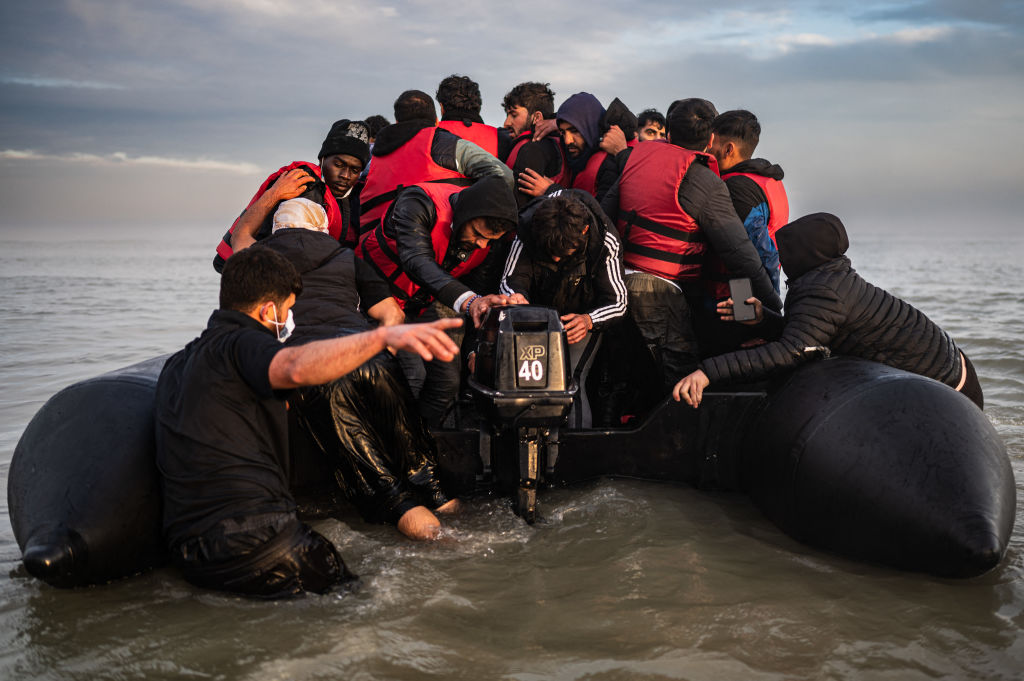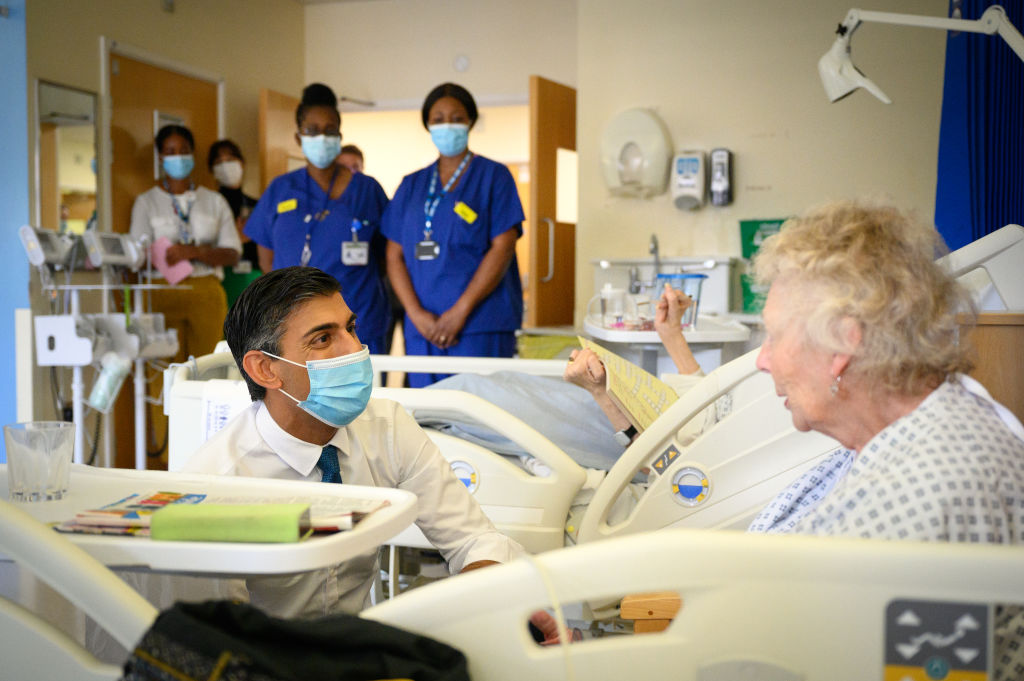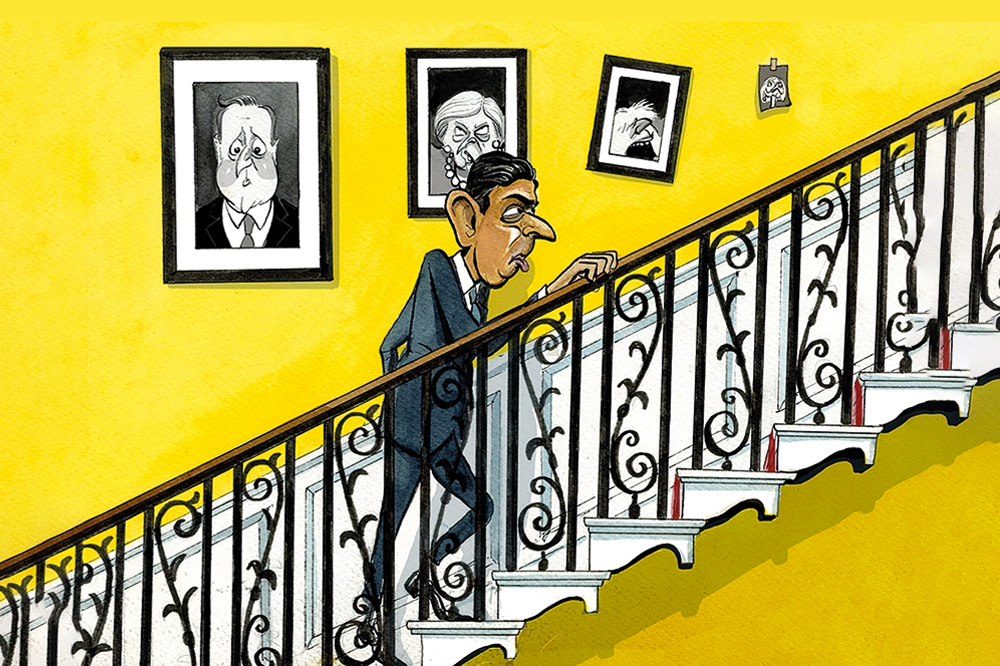London, England
After Rishi Sunak lost the Conservative Party leadership contest this summer, he started on Plan B: to be selected for the Kirby Sigston cricket team in his Yorkshire constituency. He had hoped to play for the club when he was first elected as a Member of Parliament seven years ago, but politics got in the way. Suddenly with more time on his hands, he began to enquire about this “friendly, sociable and inclusive” team — only to find out that its inclusivity had its limits. “They told me that I shouldn’t assume I could make the starting XI, because they’d won their league for two years in a row. They said I might have to go and play for the next village down.”
Sunak started practicing, but did not in the end try out. Liz Truss resigned after just forty-four days in office and he was parachuted in by Tory MPs in the hope that he could unite the party and calm the markets with a less radical Budget. “We achieved it in two-and-a-half weeks, it passed Parliament with very significant majorities and the country is supportive of the plan we have put in place,” he says. “The chancellor [Jeremy Hunt] is due enormous credit for putting together a plan that has worked. Whether it’s currency, yields or anything else, you can see the general calmness it has brought. It has worked. That, I think, is a point to reflect on.”
The bond markets had actually already settled by the time the Autumn Statement was announced — in the expectation that Sunak, a former Goldman Sachs financier, would balance the books. But he did so by lifting the tax-and-spend levels to the largest in peacetime history, via a five-year austerity plan that looks set to start with two years of recession and the sharpest fall in living standards since records began. Markets are calm, but voters less so. Polls show Labour between eleven and twenty points ahead and the Tories on course for a landslide defeat.
To be fair, Sunak has improved on the thirty-point gap he inherited from Truss. But he may struggle to further turn around his party’s fortunes or to make the switch from crisis management to laying out a broader agenda. He’s expected to try to do so in the new year.
“I’m really excited about next year,” he says. “I got this job in unexpected and very quick circumstances. And I am excited about what we do from there.”
He outlines three policy areas which he calls three “buckets that I’m thinking about.” The first is economic repair. “We have done a good chunk of the beginning of that.” The second is “reforming our public services, to make sure that they actually deliver for people.” And finally, perhaps the hardest challenge, is improving life for the next generation. “It’s about making sure we have the most exciting education system in the world, providing children and adults with the opportunities they need and making sure everyone has pride in their country, pride in their community,” he says. “Those are the three buckets. In all of those, we can make a difference in the time that we’ve got.”
The above doesn’t exactly add up to a rousing agenda. After all, what prime minister does not want to fix the economy, improve public services and bolster local pride? But understatement is part of Sunak’s strategy. As chancellor under Boris Johnson, he watched — often in horror — as the PM made attention-grabbing promises without any plan to deliver them. He warned during the leadership campaign that “fairy tales” can sink the economy and that proper solutions begin with hard truths. He sees no quick or easy way out of Britain’s high-tax, low-growth trap.
He’s keen to improve adult skills, deregulate certain financial services and promote artificial intelligence. But these seeds would take years to grow, even if they were planted now. “Yes, it won’t happen overnight,” he admits. “I think there are lots of things we can do that will drive growth both in the short, medium and longer term.”
Other problems need to be addressed more quickly. A recent survey of voters who have abandoned the Tories found almost half mention illegal crossings of the English Channel. In 2014, almost 90 percent of asylum claims were handled within six months. Now, just 10 percent are. This has led to a staggering number of asylum seekers — more than 100,000 — being supported at public expense. Quite often,1,000 a day arrive in small boats. By some estimates, 2 percent of Albania’s male population are currently applying for asylum in Britain.

“I’ve spent more time on small boats than anything else other than the economy since I got this job,” Sunak says. “Ultimately, it is a moral question. It’s about fairness. It’s not fair to hardworking British taxpayers who are having to fund all the support when there is already pressure on public services. It’s not fair on those who come here legally and abide by the rules and it undermines trust in the system. I’m as angry as anyone else about what is going on and I am determined to fix it.”
Johnson’s plan was to deport illegal arrivals to Rwanda, but this was thwarted in July by an intervention from the European Court of Human Rights. Has Plan A failed? “I wouldn’t necessarily say that,” Sunak replies. “We are in a process of being challenged and haven’t finished the process yet. We might have a High Court ruling before Christmas, actually.” But it’s still open to legal challenge.
Might we see a new law explicitly allowing Rwanda deportations, or for Britain to flat-out reject Albanians (as Sweden does) on the grounds that Albania is safe? “I’ve spent a lot of time seeing how everyone does it, how we do it and what needs to change. I’m prepared to do what it takes to fix the problem.”
This week, Sunak has announced a five-point plan to tackle illegal immigration, which includes fast-tracking the deportation of migrants from the Balkan state in a bid to clear the backlog. Legislation to make unambiguously clear that if you enter the UK illegally you should not be able to remain will follow in the new year. He hints that the government’s humiliation over Rwanda explains the delays to his plan now: he cannot afford to launch a policy that may later be defeated in courts.
“What I want to do — whether it comes to small boats, or anything — is when I stand up and tell the country this is what I’m going to do, I will actually deliver. I want people to be able to trust me when I say something is going to happen,” he says. “If that means I take a bit of extra time to get it right, then that’s the right thing to do.”
While his economic plan is marked by caution and long timeframes, he says he’ll tackle the small-boats issue with urgency. Does he have a radical side? “I supported Brexit, in a way that challenged conventional thinking. I was prepared to do something difficult — as it seemed at the time — because I believed in it. I’m going to bring that same mindset and radicalism to this problem. It’s complex, it’s multi-faceted, it’s not something that you can just do overnight. But I am confident, actually, that we can put together a plan that will significantly reduce illegal migration.”
Sunak says his second priority is the National Health Service. As chancellor he was dismayed by how little of the extra money he authorized seemed to help patients. After the latest bailout, he was told hospital waiting lists would still rise from six million to nine million. If pouring money into a failing system won’t work, then it’s time to change the system. He has set up an “elective recovery taskforce” modeled on the successful vaccine taskforce, where the NHS worked with the private sector for a public health emergency.
“The NHS should be free at the point of use. That principle is there. But ultimately, I want to figure out — how do I get patients the fastest, most effective healthcare that they need?” he says. Might this involve sending them private? “You can find lots of examples of really fantastic practice — doctors, executives who are doing things differently, which means they are already performing 10 percent more elective surgery than they did before Covid… They work with the independent sector. Nothing wrong with that. The NHS has actually done it for decades. If that’s what’s better for the patient, then great.”

Another idea is to let pharmacists prescribe more, to lift the burden from general practitioners — a case made recently in a Spectator article. “I am obviously biased,” he says (his parents ran a pharmacy). “I read it. I may well have emailed my team! But that broader point is that we’ve got to think differently. We’ve got to challenge the way that we’ve always done it, because I want to cut people’s taxes.”
Sunak sees high tax as the symptom of high spending, which needs to be controlled first. He wants this done by greater efficiencies, which in turn mean reform. “I’m willing to do things differently. That has to start with the NHS, the single biggest call on the taxpayer. If you want to reduce the tax burden over time then, yes, we need to grow the economy more. But the other thing is to reform public services, so we get more out of them for every pound that we put in.”
All this would take years — do the Tories really have this time? Sunak says there is no alternative. “Anyone promising you that you can change long-term growth trajectories overnight isn’t being straight. Some of the things that I talked about over the summer were about recognizing that you have to work hard for these things.” His leadership campaign and his premiership were both founded on this belief: that the road out of Britain’s high-tax, low-growth trap will be long and difficult.
Sunak may only have two Christmases left in No. 10 but when we meet, he’s certainly making the most out of this one. He is fanatical about Christmas and has his own traditions. One is eating “peppermint bark,” sheets of mint chocolate which he brought over from the US. He puts out a box for the interview, and later looks alarmed at how much has been demolished. At one stage, he interrupts our chat to explain very politely that he only has a few boxes and that it’s not for sale in the UK.
The prime minister has taken control of the music for No. 10 Christmas receptions (he has favorite carol albums) and is even overseeing his staff carol concert. “I’ve made sure we are divvying up the ‘Twelve Days of Christmas’ across all the different teams in the building, which I’m not sure everyone is loving,” he says. He’s deciding who sings which line. “Five Gold Rings is the one everyone wants! They were pitching for Five Gold Rings. It turns out that there are a few choral scholars in the building, so I assembled them into a choir.”
His go-to, he says, is Michael Bublé’s Christmas Deluxe album. “In the evenings working on my own I just put Bublé on. It’s great when you are signing Christmas cards to get you in the mood.”
It’s a little odd to learn that Sunak is so keen on Christmas, given that he is a devout Hindu. Religion is normally a no-go subject in politics. Prime ministers over the years have been reluctant to discuss their faith. Sunak, however, speaks about it openly.
“Faith is important to me for two reasons. For me, it certainly helps give life purpose and meaning. But it also gives strength and resilience. Those are the things that my faith does to me.” He has a small shrine at home, a standard focal point for Hindu worship. “I pray with my kids before I put them to bed. Not that I do as much of that any more,” he says. “The thing about Hinduism is that, yes, it’s a religion but it is also just a way of life. It’s cultural. So it sometimes feels broader than that.” The values, he says, include respect for elders and for education. “They are partly religious values, partly cultural values. It doesn’t fit neatly into that box. But strong families are important, service is an important concept, and duty is a really important concept in Hinduism.”
When he was chancellor, Sunak put lights for Diwali outside 11 Downing Street — which was remarkable for the fact that no one really found it remarkable. This indifference, he says, is one of the best things about Britain. “It was, in one sense, a wonderful thing about our country that I was the first British Asian PM. But it’s also wonderful that it’s not that big a deal. And that is actually what’s amazing about our country,” he says. “That second bit is equally as important as the first because it shows we have done a really extraordinarily good job of this as a country.”

He points to his desk where there is a figure of the elephant-faced Lord Ganesh, revered by Hindus as the remover of obstacles and a reminder of the importance of listening and reflecting on issues before acting. “I have the same one that I had when I was chancellor,” Sunak says. Ganesh is described as loving and polite but still strong — and it’s this last part that Sunak might struggle with, as the unions test him.
So far, Sunak is seen by the public as sensible and attentive. Those who meet him for the first time are struck by his self-effacement and politeness. But isn’t this the sort of chap whom trade unions eat for breakfast? Some Tory backbenchers are already starting to worry that he’s too keen to please, citing the compromise with rebels both on planning and wind farms (compromises which he describes as “completely overblown”). As he faces down strikes and union demands for pay rises, is there a risk his politeness will be seen as softness?
“Those are two very different things,” he says. “On strikes and on protests, I have a very strong point of view that it’s not right for a minority of people to so significantly disrupt the lives of tens of millions of ordinary hardworking British people. I got all the police chiefs in last week and was extremely robust and clear about my expectations. I’ve challenged them to tell me the powers that they are lacking.”
This may soon end up in new laws. “Ditto on strikes. Again, I’ve taken the approach of reasonableness. If union leaders are not going to act reasonably — as it is clear that they are not at the moment — then I am prepared to introduce tough new strike laws that will minimize the disruption to ordinary people and will protect people’s lives. That’s what we’re working on — at pace.”
There will be various showdowns in the new year. There is talk of laws banning ambulance drivers from striking and ensuring minimum service provision on trains. But he doesn’t go into specifics: his point is a general one. “That’s who I am. I am not afraid to be tough to achieve what I think is right for the country; people shouldn’t mistake the politeness for that.” He again mentions his support of Brexit as evidence of his ability to go against the grain. “I was prepared to challenge the conventional thinking at the time and I bring that same degree of radicalism to everything else I do.”
Would he describe himself as a polite radical? “Yes, that’s exactly right. What we should care about is getting to the ends that we want. There is no reason why you shouldn’t be polite and reasonable in your tone and approach to it, but you should be firm in what you are trying to achieve and radical in your thinking.”
Optimism, he says, is also important. “Just because we had to repair some things first, it doesn’t mean I’m not excited about growth. I am incredibly excited about delivering it,” he says. “There is a lovely Ronald Reagan quote saying there’s no great limits to growth because there are no limits to human intelligence and imagination. That largely sums up my view. I’m an optimist and think we can increase growth in this country.”
Given that most economists believe we’re unlikely to see much growth until the next election, this certainly is an optimistic view. His test next year is whether he can persuade voters to share it.
This article was originally published in The Spectator’s UK magazine. Subscribe to the World edition here.

























